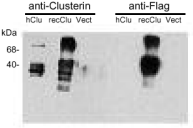Product Details
| Alternative Name: | TRPM-2, SGP-2, CLI, Apolipoprotein J, CLU, APO-J |
| |
| Clone: | CLI-9 |
| |
| Host: | Mouse |
| |
| Isotype: | IgG1 |
| |
| Immunogen: | Purified human clusterin (TRPM-2). |
| |
| UniProt ID: | P10909 |
| |
| Source: | Purified from hybridoma tissue culture supernatant. |
| |
| Species reactivity: | Human
|
| |
| Applications: | ICC, IHC (FS), IHC (PS), IP, WB
|
| |
| Recommended Dilutions/Conditions: | Western Blot (1:2,000)
Suggested dilutions/conditions may not be available for all applications.
Optimal conditions must be determined individually for each application. |
| |
| Formulation: | Liquid. In PBS containing 0.02% sodium azide. |
| |
| Use/Stability: | Stable for at least 6 months after receipt when stored at +4°C undiluted. |
| |
| Handling: | Avoid freeze/thaw cycles. |
| |
| Shipping: | Blue Ice Not Frozen |
| |
| Long Term Storage: | +4°C |
| |
| Scientific Background: | Clusterin (SGP-2/sulfated glycoprotein-2; CLI; Apolipoprotein J (Apo J); TRPM-2) is the first identified extracellular mammalian chaperone and appears to be implicated in such diverse processes as sperm maturation, regulation of complement activation, programmed cell death, tissue remodelling and lipid transport. Increases in clusterin mRNA and protein have been consistently detected in apoptotic cell death paradigms, establishing clusterin gene expression as a prominent marker of apoptotic cell loss. A dual role has been shown for clusterin in that cells can be protected from damage and dead cells can be more easily removed after some types of cellular damage. |
| |
| Regulatory Status: | RUO - Research Use Only |
| |
Please mouse over
Product Literature References
MMP25 (MT6-MMP) Is Highly Expressed in Human Colon Cancer, Promotes Tumor Growth, and Exhibits Unique Biochemical Properties: Q. Sun, et al.; J. Biol. Chem.
282, 21998 (2007),
Abstract;
Full Text
Clusterin-mediated apoptosis is regulated by adenomatous polyposis coli and is p21 dependent but p53 independent: T. Chen, et al.; Cancer Res.
64, 7412 (2004),
Abstract;
Full Text
Large-scale serial analysis of gene expression reveals genes differentially expressed in ovarian cancer : C. D. Hough, et al.; Cancer Res.
60, 6281 (2000),
Abstract;
General Literature References
Clusterin: S.E. Jones and C. Jomary; Int. J. Biochem. Cell Biol.
34, 427 (2002), (Review),
Abstract;
Clusterin/Apolipoprotein J in human aging and cancer: I. Trougakos and E. Gonos; Int. J. Biochem. Cell Biol.
34, 1430 (2002),
Abstract;
Clusterin: the intriguing guises of a widely expressed glycoprotein: D.E. Jenne & J. Tschopp; Trends Biochem. Sci.
17, 154 (1992),
Abstract;
Apolipoprotein J: structure and tissue distribution: H.V. De Silva, et al.; Biochemistry
29, 5380 (1990),
Abstract;
Characterization and cloning of androgen-repressed mRNAs from rat ventral prostate: J.G. Leger, et al.; BBRC
147, 196 (1987),
Abstract;












